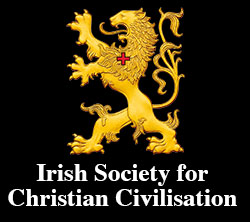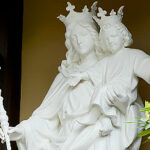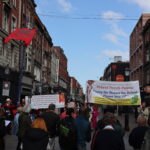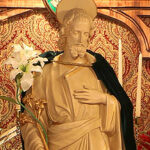
Below is an adapted version a leaflet volunteers of Irish Society for Christian Civilisation distributed to 5,000 households in Trim and the surrounding area.
What is the Púca Festival?
It is a festival, aimed at promoting Ireland as the birthplace of Halloween on an international level, taking place from October 31st-November 3rd. However, it threatens the Catholic faith and Christian culture of Ireland. The lighting of the Samhain Fire, one of the Festival’s events, is described as a “powerful ritual” that seeks to “bridge the gap between the physical and the spiritual worlds” and to carry “messages to those who have passed before us.”
Describing the Púca Procession in Trim, the Púca website tells you to “be prepared to witness shape-shifting spirits and other-worldly creatures emerging to join the revelry.”
At the “sacred” Hill of Ward, participants are asked to “prepare an offering for their ancestors.” These are just some examples of the occultist overtones of the festival.
Dabbling in the Occult
Though promoted as something fun and entertaining, dabbling in the occult always has serious consequences. “The hidden, unanticipated result of participating in these practices is that a person opens themselves up to the activity of evil spirits and, unwittingly, to the deceptive attraction of other demonic and satanic activity. In this way, a person compromises their own spiritual health and well-being because of some initial voluntary participation in things through which evil spirits gain entry into their lives.”[1]
The Catechism of the Catholic Church is clear. “All forms of divination are to be rejected: recourse to Satan or demons, conjuring up the dead or other practices falsely supposed to “unveil” the future. Consulting horoscopes, astrology, palm reading, interpretation of omens and lots, the phenomena of clairvoyance, and recourse to mediums all conceal a desire for power over time, history and in the last analysis, other human beings, as well as a wish to conciliate hidden powers. They contradict the honour, respect, and loving fear that we owe to God alone.”
“All practices of magic or sorcery, by which one attempts to tame occult powers, so as to place them at one’s service and have a supernatural power over others – even if this were for the sake of restoring their health – are gravely contrary to the virtue of religion.”[2]
ISFCC Caravan: A Journey of Faith Across Ireland
An Attack on the Christian Culture of Ireland
This festival tends to obscure the Catholic Church’s triumph over paganism with the coming of Saint Patrick to Ireland and obliterate the legacy of our great patron saint whose apostolate began precisely in the east of Ireland. No matter how much the Catholic Church is attacked today in the media, it is impossible to ignore the massive contribution it has made to this country. Of course, the greatest contribution of the Church to society is teaching the Catholic Faith. By appealing to the country’s ancient pagan roots, the Puca Festival represents an attack on the Catholic Faith.
The Real Halloween
Halloween is simply a corruption of the words All Hallows’ Eve, the day before All Saints Day. In the 8th century, Pope Gregory III instituted All Saints Day on November 1st, automatically making October 31st the Eve before All Saints.
November 2nd is the “Commemoration of All the Faithful Departed” which is founded upon the Catholic Church’s doctrine that those faithful who have not been cleansed from the temporal punishment due to sin and from their attachment to sin cannot enjoy the Beatific Vision in heaven immediately upon their death. They must first go through Purgatory. It is a day we can celebrate and imitate the hundreds of great Irish Saints who have gone before us.
In contrast with this tradition, one Púca Festival participant in 2022 said that, “Púca is from the underworld… We need to mind ourselves and we all dress up so we don’t end up in the underworld…We are here to stay safe.”
An Attack on Irish Values
Irish are world-famous for their kindness, hospitality, and amiability. In contrast, the aspects that are celebrated in the Púca festival idols are the opposite of this: “Fear,” “destruction,” “mischief,” “havoc,” “malevolence”, according to a local historian.[1]
Who Do We Want our Children to Imitate?
The people or things we admire influence us for good or for bad. Do we want our children to take the Púca as a role model? Do we want to set up as something worthy of our children’s admiration Morrigan, the goddess of battle rage, destruction and war? Or do we want our children to admire the example set by the saints such as St. Francis of Assisi, St. Therese of Lisieux and St. Ferdinand of Spain?
As Catholics we are called to live in society and make it more Catholic. This is the Christian Civilisation we strive for. The Púca Festival on the other hand is an invitation to the occult and to further erase Christianity from society.
God is the Solution, not Evil!
The devil will do all tricks to ensnare people. Ugliness and evil ultimately lead to the devil. They don’t encourage kindness or love. God on the other hand, calls us to kindness and love. By turning to God, we can appreciate the real history of Trim, a Catholic history it can be very proud of.
St. Augustine says to God, “You have made us for Yourself, O Lord, and our heart is restless until it rests in You.” Let’s therefore turn back to God and his Commandments.
1 https://gidiocese.org/news/statement-on-the-dangers-of-exploring-forms-ofdivination-and-occult-practices
2 https://www.vatican.va/archive/ENG0015/__P7E.HTM
3 https://www.youtube.com/watch?v=mP1K5eQjzs0
*Front image By Andrew Parnell – Trim Castle, CC BY 2.0, https://commons.wikimedia.org/w/index.php?curid=1589876
This year, it is more crucial than ever that we turn to prayer and intercession to increase devotion to Our Lady across our country. That’s why you’re invited to join us in the Three Hail Marys Pledge, a powerful devotion that can bring personal spiritual benefits and national transformation. By reciting three Hail Marys daily, you honour the Immaculate Heart of Mary and seek her intercession for the conversion of sinners, the salvation of souls and the restoration of Ireland’s Catholic Faith. This ancient devotion, revealed to Saint Mechtilde, promises spiritual benefits including protection from mortal sin and the assurance of a good death. Your daily prayers will contribute to an increase in devotion to Our Lady, the conversion of sinners and the moral renewal of our country. Let us commit to this powerful devotion and seek the guidance and protection of Our Lady.






Yes this Puca festival promotes paganism and is anti Catcholic and anti Christian not good for the soul.
What a load of Catholic crock! The biggest cult in Ireand is the Catholic Church
If that’s true Tom, it’s the biggest in the world. Of course that gets under your skin 🤣